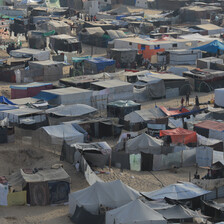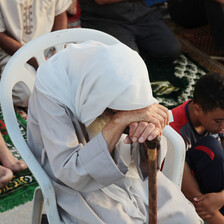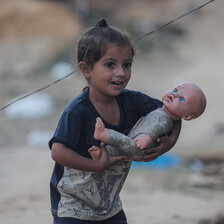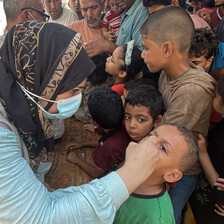The Electronic Intifada 3 June 2024
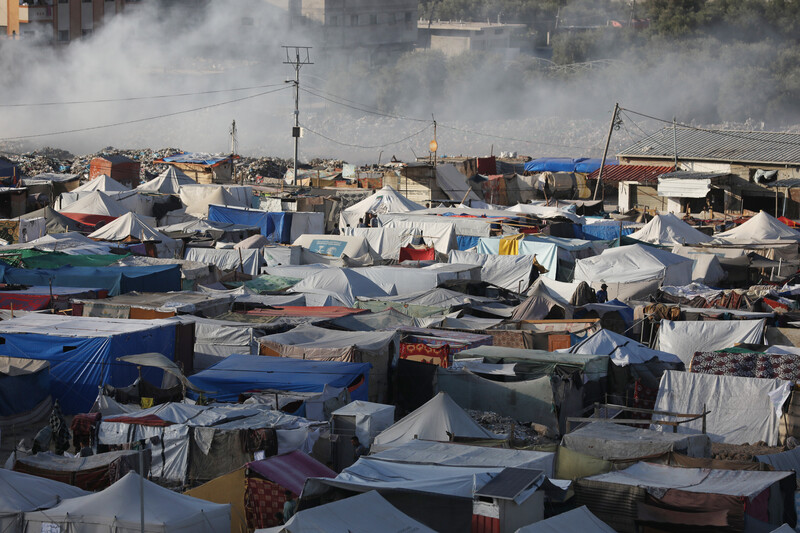
Overcrowded and unsanitory conditions for the 1.7 million people in Gaza who have been forcibly displaced have led to a spike in infectious diseases. Here a shelter in Nuseirat on 14 May.
APA imagesDeath by bombing is not the only thing that destroys the lives of Palestinians in Gaza.
The spread of infectious diseases, high temperatures, water and air pollution, as well as hunger, and displacement, with 1.7 million people forced into overcrowded, unsanitary shelters, have also taken a severe toll.
All of these conditions hit the young, old and those suffering other health conditions disproportionately.
In early January, Ahmed al-Weidy, a lively 17-year-old, contracted hepatitis and “suffered from general weakness, loss of appetite, yellow eye color, and diarrhea,” his mother, Samia, said.
“Since birth, he had suffered from an inability to absorb enough oxygen and couldn’t move his neck well. His fingers were cramped, and he couldn’t move them as well. He underwent more than one physical therapy session, but to no avail, and his condition did not improve.”
Adding to Ahmed’s physical problems came those tied to trying to avoid Israeli bombardments, being surrounded by devastation and destruction and having trouble sleeping at night.
Last October, Ahmed and his family, like hundreds of thousands of others, were displaced from Gaza City and forced to move to a shelter in a United Nations Relief and Works Agency for Refugees, UNRWA, center in the city of Deir al-Balah in the central Gaza Strip.
Overcrowded, suffering from the total absence of any functioning municipal services, and devoid of the most basic necessities of life, polluted water and waste accumulate near such shelters in which hundreds share toilets.
Infectious and skin diseases spread rampantly in such conditions.
Hospital treatment
Ruba Hijeh, a doctor the Al-Aqsa Martyrs Hospital, said the destruction of vital infrastructure and the impossibility of providing municipal services have played a key role in the spread of diseases.
“Solid waste is collected in random dumps next to the tents of displaced people, and this waste and wastewater accumulation cause the spread of harmful insects that transmit diseases.”
The doctor said the young are particularly vulnerable and that there had been a large number of children arriving at the hospital with hepatitis A, gastroenteritis, and diarrhea.
The UN has reported that children under 5 make up a disproportionate number of those affected by the spread of infectious diseases, affecting anywhere between a quarter and one-third of reported cases.
With medical services under great strain due to Israel’s genocidal violence, the al-Weidy family initially tried to treat Ahmed at home with a diet rich in sugar, including dates, jam and honey.
But, with no improvement in his health, in January, they took him to a hospital.
They say he was injected with a sugar solution but lost his ability to see and began to speak incomprehensible words.
Ahmed’s mother asked the doctor to feed him sugar and honey, but the family says after the doctor inserted a nasogastric tube through his nose to feed him, Ahmed began to bleed profusely.
Then, as Ahmed slipped into a liver coma, bombings in the area intensified, and doctors and medical staff were unable to reach the hospital.
Ahmed received no further treatment and passed away after a day and a half.
Shocked and saddened
The news of Ahmed’s death appalled relatives, who were also unable to reach the hospital to console his father.
“I am still in shock,” his sister Nour said. She said the Israeli military and its outsized violence had made it impossible for the hospital to provide proper care, equating it to a horrific crime. “He simply needed a specialist to examine him, and we did not find one in the whole hospital.”
Samia said: “This cruel war came and snatched his innocent soul and his rosy dreams.”
She said she dreamed of Ahmed “riding a bike and laughing in heaven,” pointing out Ahmed had difficulties doing so while alive, but might finally do so after death.
Ahmed’s story is certainly not the only one of its kind.
The government media office in the Gaza Strip has announced that there are over 1 million cases of communicable diseases in Gaza due to displacement and overcrowded and unsanitary conditions, as well as 20,000 cases of viral hepatitis infections.
The World Health Organization, meanwhile, found a surge in infections prior to Israel’s latest Rafah operation, with anywhere between a 45 percent to 53 percent increase in reported cases and a 200 percent increase in the number of reported cases of bloody diarhea.
Nour said she has decided to study medicine to honor her brother and help do what she can to win the battle against infectious disease.
Tasneem Elholy is a dentistry graduate based in Gaza.

